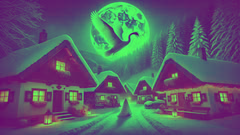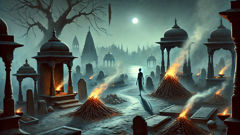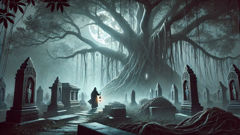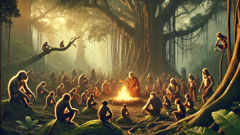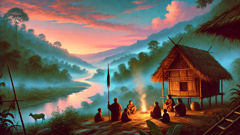Introduction
Amid the snowbound peaks and shadowed valleys of medieval Austria, winter was not merely a season—it was a force. The air grew sharp as crystal, the pine forests whispered with secrets, and every thatched rooftop bore the hush of anticipation as December waned. In these wild, mountainous lands, where the sun set early and the wind swept the world clean, villagers clung to ancient customs to keep the darkness at bay. Every winter, as the twelve longest nights—those between Christmas and Epiphany—descended, the air thickened with more than frost: it brimmed with tales, half-whispered by fireside and etched into the very bones of the Alps. Among all the stories, one name stirred both hope and dread—Perchta, the goddess who strode through snow and shadow, judging the hearts and habits of mortals.
Perchta was neither wholly kind nor wholly cruel. She was the winter’s fairness, as impartial and inevitable as falling snow. Known to some as Berchta or Frau Perchta, she appeared at night draped in a cloak of swan feathers, her face sometimes radiant and beautiful, other times veiled and stern. She was said to glide silently through drifting flakes, her steps leaving no mark, attended by a retinue of restless spirits. To the diligent and industrious, Perchta brought blessings—gleaming coins, full larders, and the promise of spring’s return. To the idle or deceitful, she offered harsher gifts: punishment swift and unerring, a reminder that in the frozen heart of winter, honesty and hard work alone could fend off despair.
In the flickering lamplight of rustic kitchens, children waited breathless to hear if Perchta’s judgment would fall upon their homes. Mothers spun flax and wove linen long into the night, for legend held that unfinished thread or neglected chores would draw her ire. Fathers stoked fires and guarded doorways, casting wary glances at the silvered world outside. As the bells of midnight tolled and the mountains shivered under starlight, the villagers trusted in their labors and whispered prayers to Perchta, hoping she would pass their thresholds in silence or with the softest of blessings. This is the story of Perchta—the Alpine goddess whose wisdom and justice shaped the fate of all who dwelled beneath the winter sky.
The Gathering Storm: The Approach of the Twelve Nights
As autumn faded and the last leaves tumbled from the beech trees, the villagers of Oberthal prepared for the long sleep of winter. Their lives were woven tightly with tradition, and every custom held meaning, especially as the solstice neared. In the weeks before Christmas, a peculiar tension gripped the mountains—something subtle, like a wolf’s shadow slipping between trees. Elders whispered that this was not mere weather or the shifting of seasons, but the first stirring of Perchta, who waited at the edge of the world until the year’s turning.
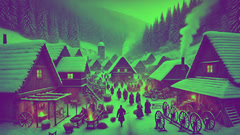
The people hurried to finish their chores. Women spun flax into fine linen until their fingers cramped, for Perchta loved industry above all. She was said to inspect the homes she visited during the Rauhnächte—the Twelve Nights—peering into cupboards, lifting lids from pots, and checking every spindle. The flax had to be spun, the house swept clean, and nothing left unfinished, lest her wrath be provoked. Children gathered brush for the hearth, their cheeks pink with cold, while the men repaired fences and checked traps high in the snowy woods. The smell of woodsmoke and baking rye mingled with the sharp tang of pine resin as families prepared for their annual trial.
On the eve of Christmas, a hush fell over Oberthal. Inside every home, the lamps were lit, and old tales filled the air like drifting snowflakes. Grandmother Marta sat at her spinning wheel, her stories as vital as her steady hands. She recounted the tale of Perchta’s two faces: one fair, bestowing silver coins on diligent households; the other terrible, punishing sloth and lies. Marta’s words painted a picture of Perchta gliding across the valleys, her eyes keen as a hawk’s, her retinue of spirits—known as the Perchten—flitting at her side. Some said they were lost souls, others claimed they were mischievous woodland sprites, but all agreed they followed Perchta’s command, assisting her in her nightly judgments.
As the village settled, snow began to fall—soft at first, then thick and relentless, muffling every sound. Beneath the weight of winter, time slowed. The animals in their stalls grew quiet, the river froze, and the mountains themselves seemed to hold their breath. The first night of the Twelve had begun, and with it, Perchta’s watchful journey. In a cottage on the edge of the forest, young Anneliese pressed her face to the windowpane, searching for movement among the swirling flakes. Her mother, Elsa, gently drew her away, murmuring that Perchta favored those who let their work speak for them. Yet curiosity gnawed at Anneliese; she wanted to see for herself whether the goddess would truly come, whether her family’s efforts would earn blessing or punishment.
That night, as the wind keened around the eaves and shadows danced on the walls, Anneliese lay awake listening. Somewhere beyond the village, a faint bell chimed, followed by the rustle of unseen wings. The scent of goose feathers and melting snow drifted through the cracks in the shutters. It was said that if one was very still, very quiet, Perchta might pass by unnoticed—or perhaps, just perhaps, leave a token by the hearth. The hope of her favor and the fear of her justice settled over Oberthal like a second blanket of snow.
Perchta’s Judgment: A Night Among Mortals
The second night of the Rauhnächte arrived with a sky blacker than pitch, broken only by starlight and the ghostly shimmer of snow. Anneliese could not sleep. She rose quietly, careful not to wake her brother, and crept to the hearth where embers glowed red and gold. There, on the worn stone ledge, she placed a handful of spun flax—her own humble offering, twisted with care. She whispered a plea for Perchta’s kindness, feeling both childish and desperate. All around her, the house was silent except for the ticking of the old clock and the distant howl of wind.
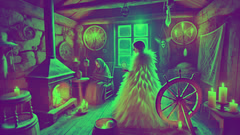
Outside, Perchta moved through the night with a grace that belonged to neither human nor beast. Her swan-feathered cloak brushed against drifts, yet left no track. In her hand she carried a staff adorned with bones and bells that sang a song only spirits understood. Her eyes were keen as ice, reflecting every lamp burning in Oberthal. At her side, the Perchten danced—sometimes fierce, sometimes gentle, each one bearing a lantern or a mask carved from wood. Their faces flickered between joy and menace as they surveyed the sleeping village.
Perchta’s first stop was the home of old Marta. She slipped in through a seam in the night, her presence announced only by a chill that crept beneath the door. Marta stirred in her chair, sensing a watcher. In the flicker of lamplight, she glimpsed a woman both young and ageless, stern and merciful. Perchta touched the spinning wheel and nodded; every thread was finished, every task complete. With a gentle gesture, she laid a small silver coin among Marta’s spools—a blessing for diligence.
House after house, Perchta judged in silence. Where children had helped their parents, where bread had been shared with the hungry, where truth had been spoken even when it stung—there she left gifts: coins, ribbons, sweet cakes. But in one cottage at the village edge, she found chaos: unspun flax spilled from baskets, dust thick on the shelves, scraps of food left to rot. The air was sour with neglect. Perchta’s face darkened. With a motion swift as winter wind, she raised her staff. The Perchten circled, their masks grim. When dawn came, the cottage was empty. Its former inhabitants had vanished, and only a scattering of feathers and a deep silence remained.
Anneliese’s family slept uneasily, dreams haunted by shifting shadows. When morning came, she rushed to the hearth. There, nestled beside her spun flax, lay a silver coin gleaming in the pale light. Relief flooded her—Perchta had seen her work. Elsa smiled softly and pressed the coin into Anneliese’s palm. That day, the village buzzed with rumors: whose homes had been blessed, whose had suffered loss. None dared speak openly of punishment, but everyone felt the lesson as keenly as cold air. Perchta’s justice was impartial, her wisdom impossible to predict. In Oberthal, no one could ignore her presence or the truth she demanded each winter’s night.
The Shadowed Woods: Trials and Temptations
The days that followed were a delicate balance of anticipation and anxiety. The villagers redoubled their efforts—sweeping floors, spinning thread, sharing food with neighbors who had little. Even children felt the weight of Perchta’s gaze; they quarreled less, offered to help with chores, and listened intently to stories around the fire. The winter woods, though beautiful, seemed to hold new dangers. It was said that during the Rauhnächte, spirits walked freely and wild creatures grew bold. The villagers avoided venturing beyond the tree line after dusk.
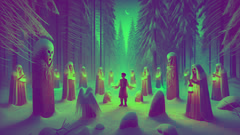
But not all heeded the warnings. One afternoon, as mist gathered in the hollows and frost crept along the fence posts, Anneliese’s older brother Jakob grew restless. He was clever and strong, but prideful. Dismissing his grandmother’s cautions as old wives’ tales, he slipped away with a friend to hunt in the deep forest. They believed themselves safe—after all, Perchta’s concern was with lazy villagers, not adventurous boys.
The forest was hushed beneath its snowy mantle, every sound magnified. Birds flitted silently from branch to branch; a fox’s paw print marked the trail like a warning. Jakob and his friend laughed as they tracked a hare, but soon the laughter faded. The forest thickened, trees pressed close, and shadows shifted in ways they did not understand. The boys stumbled into a clearing ringed with ancient stones, where a strange coldness hung in the air. From the darkness between the trunks, figures emerged—masked and silent, their lanterns flickering blue and green. Jakob’s bravado crumbled as he recognized the Perchten.
At their head, Perchta appeared, her eyes luminous in the dim light. She spoke not in words but in a voice that filled their minds like wind through pine. She knew Jakob had shirked chores and mocked tradition; his pride had led him astray. With a single gesture, she beckoned him forward. The Perchten encircled him, their masks twisting with sorrow and warning. Jakob trembled as Perchta reached into her cloak and drew forth two small stones: one smooth and warm as summer earth, one cold and jagged as ice. She pressed them into his hands and whispered that every choice had consequence—work or idleness, honesty or deceit, courage or folly.
Jakob’s vision blurred. He saw himself at home, helping his family, laughter echoing in a tidy kitchen. Then the scene shifted: he saw loneliness, hunger, a house in ruin. The stones grew heavy, pressing into his palms until he cried out. In that moment, Perchta’s gaze softened. She released him, and he stumbled backwards into his friend’s waiting arms. The Perchten faded into the woods, and the cold lifted. Jakob and his friend ran home, breathless with fear and relief.
That night, Jakob confessed his pride and folly. He spent the rest of the Rauhnächte working harder than anyone—splitting wood, mending fences, tending animals without complaint. Anneliese watched him quietly and knew he had learned Perchta’s lesson: diligence was not a burden, but a gift that bound family and village together, even in the heart of winter.
Conclusion
As the last of the Twelve Nights faded and Epiphany’s dawn painted the mountains rose and gold, a new quiet settled over Oberthal. The air was lighter, filled with the promise of lengthening days and the distant hope of spring. Within every cottage, silver coins glimmered in secret places—tokens not only of Perchta’s blessing but of shared effort and renewed trust. Jakob no longer mocked old customs; Anneliese’s flax was spun with greater care than ever before. Even the elders smiled more easily, their stories carrying the weight of lessons well learned.
Yet Perchta’s legacy lingered long after the snow had melted from the eaves. Her wisdom echoed in every task—reminding the people that diligence knit community together, that honesty gave warmth even when the world turned cold. The goddess was never seen in daylight, but her mark lay in every simple kindness, every job well done. For each winter would bring its own darkness, its own tests, but Oberthal would meet them with hands busy and hearts steadfast, remembering that in the heart of winter, justice and wisdom walk quietly among us—sometimes seen only in the soft shimmer of feathers upon the snow.

